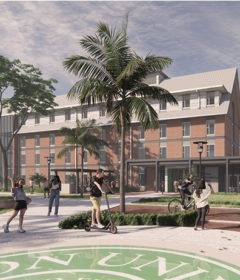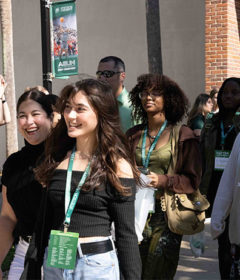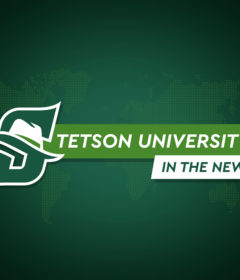“Recovering the Dream:” Stetson celebrates MLK at virtual event Wednesday
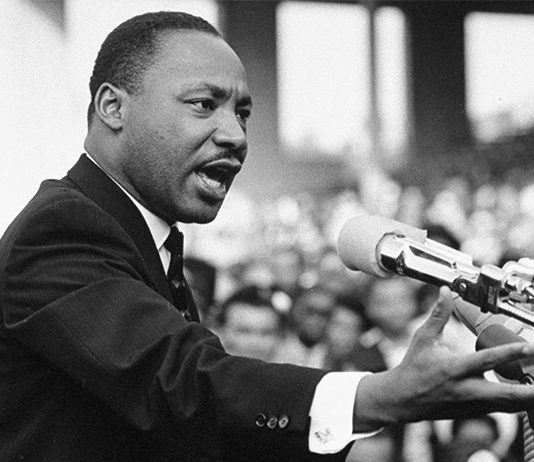
Joanne Harris-Duff, director of Diversity and Inclusion at Stetson University, remembers when her parents took her and her siblings to “our very first protest” in the small town of Bedford, Va., in 1980.
“The Ku Klux Klan was marching on their horses with their hoods on, because they didn’t want black kids and white kids going to school together,” she says.
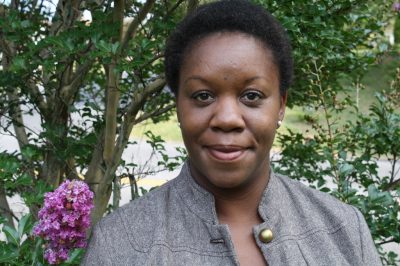
“I was 5-years-old,” says Harris-Duff, who will speak at the Second Annual Martin Luther King Jr. Life & Legacy Virtual Event from 6:30-8 p.m. on Wednesday, Jan. 20. “The local NAACP and churches had made signs with quotes from Dr. Martin Luther King that we were holding up.”
She and her siblings “were too little to hold them by ourselves, but I remember holding onto a sign that my daddy was holding. We were silent, but our presence was powerful. Our mom taught us never to be afraid to face fear – to look fear eye to eye. I will always remember that.”
The annual DeLand MLK Celebration’s breakfast, traditionally hosted by Stetson University, will not be held this year due to the COVID-19 pandemic. The MLK virtual event, themed “Recovering the Dream,” will be presented by the Office of Diversity and Inclusion and sponsored by the Multicultural Student Council.
The event will include welcoming remarks by Harris-Duff, a keynote address by DeLand attorney Ted Small, presentations of the Dr. Martin Luther King Jr. Legacy Award, given to a Stetson faculty member, and the Pioneer for Multicultural Advocacy Award, given to a Stetson administrator or staff member.
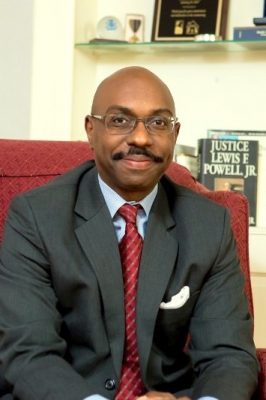
An original poem will be read by Rajni Shankar-Brown, PhD, associate professor, Jessie Ball duPont Endowed Chair of Social Justice Education and Executive Board member of the National Coalition for the Homeless, and resolutions will be read by Stetson President Christopher F. Roellke, PhD, and others.
Small, the keynote speaker, is a DeLand attorney and graduate of Harvard College and the University of Virginia School of Law. He has worked to create university and community-based programs to facilitate equity and inclusion, and to foster discussions about law and the intersectionality of race, diverse characteristics and poverty.
Please register online here by Monday, Jan. 18, to attend the Martin Luther King Jr. Life & Legacy virtual event. A link will be emailed to attendees one day prior to the event.
Also, a Dr. Martin Luther King Day Virtual Celebration, organized by Stetson alumna Primrose Cameron, will be held 10-11:30 a.m. Monday Jan. 18. Attendees should register online here in advance.
The tumultuous events of the past year – the police killings of Breonna Taylor and George Floyd, the government crackdowns on peaceful Black Lives Matter protests, the muted security response to the siege at the U.S. Capitol, in which one of the white rioters paraded with a Confederate flag through the building – seem to indicate the nation has gotten ever further from the ideals of King and his “beloved community.”
This year’s MLK Life & Legacy event will take place on Inauguration Day, hours after the swearing in of President-elect Joe Biden and Vice President-elect Kamala Harris, the nation’s first female vice president, first African-American and first of Indian descent. Far-right groups have called for more protests and violence leading up to Inauguration Day, and thousands of troops are now providing security in the nation’s capital.
Amid the unrest, Harris-Duff sees reasons to be hopeful.
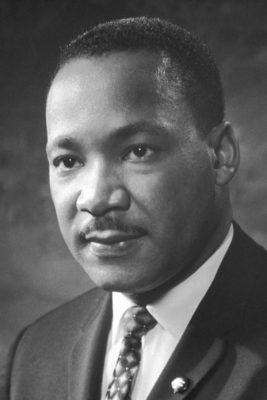
Born: Jan. 15, 1929, in Atlanta
Died: Assassinated April 4, 1968, at age 39 in Memphis, the day after giving his famous “I’ve Been to the Mountaintop” speech. Hear the full speech here.
“The division in our community, in our country right now – it is not new,” she says. “What changed is we have cell phones — we have Generation Y, we have Generation Z, we have our Millennials. They are the ones who are re-energizing this civil rights movement. We have this new generation of people and those folks may not look like this big pillar of Rev. Dr. Martin Luther King Jr., but we’re everywhere. We are sitting at the table at our school boards. We are leaders in our church. We are directors of offices of diversity and inclusion,” she adds with a soft laugh.
“We are in the classroom teaching, we are attorneys, we are stay-at-home moms, stay-at-home dads, we are stepparents and we have more white allies than ever. That’s something that I definitely think has come to fruition that we were hoping for. Rev. Dr. Martin Luther King’s dream never went away. It continues to be re-energized, but it just looks different in different places.
“Just as hate presents itself, there is always beauty that never goes away. Through clouds and clouds and clouds of smoke, there is another side – and it’s sunshine, and we’re trying to get to it. It’s there,” she says.
Shankar-Brown, who will read her new poem, “Nyaya Sings: A Revolution of Love and Liberation” at the MLK virtual event, was born in Washington, D.C., but her parents were born in India. She spent much of her childhood “navigating” between the U.S. and India. Her grandfather was a journalist who worked alongside Mahatma Gandhi, the Indian lawyer, politician and social activist who led his country’s nationalist movement against the ruling British.
Though King was 19 when Gandhi was assassinated in 1948 and never met the Indian leader, King learned about Gandhi through his writings and a trip to India in 1959. King was inspired by Gandhi’s principle of nonviolence, which greatly informed his own civil rights activism.
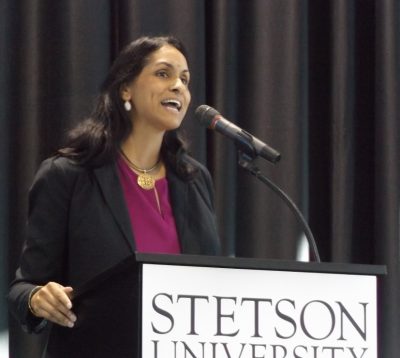
“I feel fortunate to have been organically immersed in the work of Mahatma Gandhi,” Shankar-Brown says. “Amma, my mother, had heard so many stories from her father, my Thatha G., who worked alongside [Jawaharlal] Nehru and Gandhi and many of the leaders of India’s freedom movement. So, I grew up in a household where we heard those stories as well, and Dr. King’s name would always come up.
“Much of my work as a social justice educator-scholar is rooted in Satyagraha, which is a concept coined by Gandhi in 1906 and embodied in Dr. King’s life and legacy. Satayagraha is based on the Sanskrit word ‘satya’ which means truth and love, and ‘agraha,’ which means firmness and persistence. Juxtaposing satya and agraha, the concept symbolizes love, truth and action. I see it as soul-force, or a powerful and peaceful, non-violent means for civil activism, equity and social change.
“Dr. King’s teachings, life and legacy provided a bridge for me to make sense of my own activism and life and the world around me, because he had those connections to my Indian roots. He very much had a powerful influence on me.”
The term “Nyaya” in the title of Shankar-Brown’s poem also is a Sanskrit word, although she notes that many Sanskrit terms actually embody concepts “that can evolve or change depending on the context,” she says. “The word Nyaya does mean ‘justice’ in many ways, but it’s also a concept. It’s justice tied to this idea of beloved community and love in action, this idea of justice as social equality, working to eliminate suffering of any kind, even suffering of animals, suffering of our planet, as we are all deeply interconnected.”
This year’s MLK program won’t be the first time Shankar-Brown speaks at a public event honoring the civil rights icon. As a seventh-grader at a Virginia public middle school in the late 1980s, she participated in a youth oratorical contest at a massive MLK celebration attended by Congressman John Lewis and other civil rights leaders. Her speech, titled “Let Love and Freedom Ring,” took first place.
“It was a transformative experience,” Shankar-Brown says. “And our work to bend the arc toward justice and build beloved community is far from finished. We must keep marching.”
— Rick de Yampert

